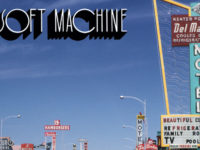Allan Holdsworth’s career is perhaps nearly as well known for his brief stays in well-regarded prog and fusion bands as it is for his guitar wizardry. Tony Williams’ Lifetime, UK and even Level 42 all have Holdsworth “one-and-done” studio albums. (OK, Lifetime had two Holdsworth albums but we pretend that Million Dollar Legs never existed). Holdsworth’s first significant stopover was with the jazz-rock group Tempest in the early 70s but by the end of ’73 he jumped shipped to join the Soft Machine, becoming the first guitarist to join the band on a permanent basis since SM co-founder Daevid Allen. In 1974, the group recorded what became released as Bundles the following year, but by that time, Holdsworth had departed to join Lifetime, replaced in the spring of 1975 by John Etheridge.
Thus, this short period with a line-up that also included sole remaining original member Mike Ratledge (keyboards), Karl Jenkins (keyboards, reeds), John Marshall (drums) and Roy Babbington (bass) was a special time for the group, with its strongest line-up since drummer Robert Wyatt left the band in 1971. Moreover, they had a potent soloing powerhouse in Holdsworth, who can swiftly tear through complex changes and whose trademark legato techniques were already in full bloom by the mid-70s. Floating World Live, finally seeing the official light of day six years ago, was culled from a January 1975 concert for Radio Bremen and is the few non-bootleg recordings of the Soft Machine captured live with Holdsworth (BBC Radio 1971-1974 is another). That Soft Machine’s live performances tend to be superior to their studio recordings lent even more importance to Floating in completing the late-period SM archive.
[SOMETHING ELSE! REWIND: The Soft Machine was captured on a West German TV show just months prior to the Holdsworth Era, documented on the CD/DVD set NDR Jazz Workshop – Hamburg, Germany, 1973.]
The set is a single disc release, but barely so: nearly 75 minutes over thirteen songs were packed into this CD, six of these songs coming from the then-unreleased Bundles, one from Seven (“Penny Hitch”) and a few tunes that are essentially improvisations made up largely on the spot. At this point in time, they’ve put the Wyatt/Hugh Hopper/Elton Dean era of the band firmly behind them, both in terms of repertoire and the basic approach to the music. It also becomes clear after the warm-up atmospheric song “The Floating World” that the band knew what they had with Holdsworth by quickly making him the primary soloist of the group. A flurry of notes on “Bundles” gains momentum and becomes a blizzard. “Bundles” segues right into “Land of the Bag Snake” where Holdsworth simply reloads and fires off another head shaking sequence of splayed notes.
“The Man Who Waved At Trains” recalls Jean-Luc Ponty of that time frame with the violin played over Babbington’s circular bass riff. A violin played by, yes, Allan Holdsworth. The pace quickens as “Trains” becomes “Peff” and while Holdsworth switches back to guitar, Jenkins solos with what seems to be a scary sounding oboe as Marshall’s kit work explodes behind the band. Marshall grooves hard on “Riff III,” at times overshadowing even Holdsworth from behind.
Along with some fantastic performances, this album has a couple of flies in the ointment. As much as I admire Marshall’s and Babbington’s musicianship, it’s still difficult to sit through a six minute bass solo (“Ealing Comedy”) or a ten minute drum solo (“J.S.M.”). Ratledge’s analog synth show (“North Point”) might have sounded pretty slick back then but it’s painfully dated today. The last quibble is that the performance of Bundles‘ best track, “Hazard Profile, Part One,” fades out just as Holdsworth gets cranking. That’s neither the band’s nor the label’s fault, this happened to be the spot where Radio Bremen decided to place their commercial break.
Hearing in a concert setting one of the most vital bands from the Canterbury Scene revitalized by the timely entrance of young legend-to-be guitarist easily overcomes those warts. Floating World Live showed the world well after the fact that the Softs still had some life left in it, retaining its ability as one of the most exciting improvisational units in jazz-rock during that music’s heyday of the 70s. The band would continue to suffer turnover — Ratledge himself would be gone in a year’s time — and Soft Machine would eventually peter out by the end of the decade, but at least this rare lineup was chronicled both live and in the studio so that Soft Machine’s Indian summer could be preserved for posterity and for just some plain good listening enjoyment.
The progressive music-oriented label MoonJune Records originally released Floating World Live in March, 2006. MoonJune has reisuued the album this year with the musical contents the same, but this time presented in a digipak format with a 16 page booklet, which includes excerpts from interviews with the members of this 1974-75 Soft Machine line-up.
[amazon_enhanced asin=”B000E3LHX2″ /] [amazon_enhanced asin=”B0039L1JAC” /] [amazon_enhanced asin=”B000H8RWCE” /] [amazon_enhanced asin=”B0000004F9″ /] [amazon_enhanced asin=”B0039L1JAC” /] [amazon_enhanced asin=”B000H8RWFG” /][amazon_enhanced asin=”B003ZBX84G” /] [amazon_enhanced asin=”B000H8RWEM” /] [amazon_enhanced asin=”B000H8RWEW” /] [amazon_enhanced asin=”B000H8RWF6″ /]
- Ches Smith Quartet – ‘Clone Row’ (2025) - May 30, 2025
- James Brandon Lewis Quartet – ‘Abstraction Is Deliverance’ (2025) - May 27, 2025
- Soft Machine – ‘Drop’ (1971, 2025 remaster) - May 21, 2025



